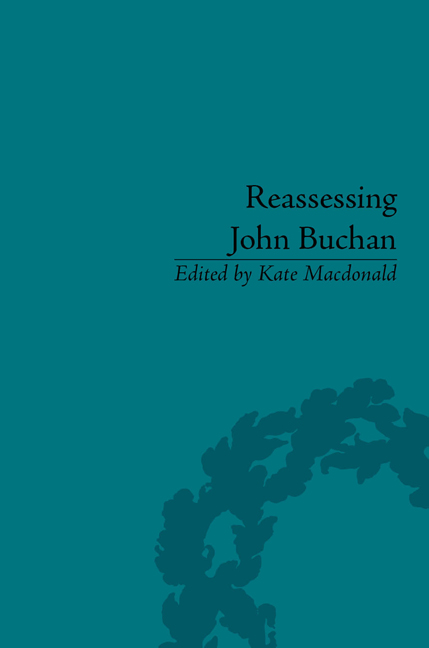Book contents
- Frontmatter
- CONTENTS
- List of contributors
- Introduction
- I Cultural Roots
- 1 John Buchan and Calvinism
- 2 Buchan and the Classics
- 3 ‘Twin Loyalties’: John Buchan's England
- 4 Buchan, Sport and Masculinity
- 5 John Buchan and the Creation of the Springbok Warrior
- II Divided Loyalties
- III Literary Art
- Notes
- Works Cited
- Index
3 - ‘Twin Loyalties’: John Buchan's England
from I - Cultural Roots
- Frontmatter
- CONTENTS
- List of contributors
- Introduction
- I Cultural Roots
- 1 John Buchan and Calvinism
- 2 Buchan and the Classics
- 3 ‘Twin Loyalties’: John Buchan's England
- 4 Buchan, Sport and Masculinity
- 5 John Buchan and the Creation of the Springbok Warrior
- II Divided Loyalties
- III Literary Art
- Notes
- Works Cited
- Index
Summary
In his multifarious roles of poet, anthologist, novelist, journalist, businessman, committee man and politician, John Buchan saw to it that Scotland maintained, and was seen to have maintained, a distinctive cultural identity. His historical fiction and biography were reminders of Scotland's past, as was his active membership of Scottish historical, antiquarian and literary societies and his editorship of the Scottish Review (1907–8). His Scottish novels offered explorations of the national psyche, while his work in poetry – in his own writing and as editor of the anthology The Northern Muse (1924) – showed his commitment to the Scots language and its traditions. It is hardly surprising, then, that he has been considered an important figure in the foundation of the Scottish literary revival of the interwar years, and that Hugh MacDiarmid, the movement's godfather hailed him as ‘the Dean of the Faculty of Contemporary Scottish Letters’.
But to characterize him as a Scottish writer is to tell only half – perhaps less than half – of the story. Buchan's Scottish birth and upbringing would always remain central to his concerns, but his involvement with wider British and imperial issues meant that his attention was often focused elsewhere. In most practical senses this meant England, the nation that provided him with the completion of his formal education and his home as an adult. England properly became a subject in his fiction only after the First World War, in a series of novels from Mr Standfast (1919) to The Free Fishers (1934) that dealt with the nation at significant moments in its history. Just as he had done in his early Scottish writing, in Sir Quixote of the Moors (1895) and John Burnet of Barns (1898) and the short stories in Grey Weather (1889) and The Watcher by the Threshold (1902), in which he had attempted to account for the historical, topographical and religious qualities that combined to form a distinctive Scottish national identity and temperament, so too in his English fiction he set himself to uncovering the elements that made for a specific, independently English, genius loci.
- Type
- Chapter
- Information
- Reassessing John BuchanBeyond the Thirty Nine Steps, pp. 29 - 40Publisher: Pickering & ChattoFirst published in: 2014

